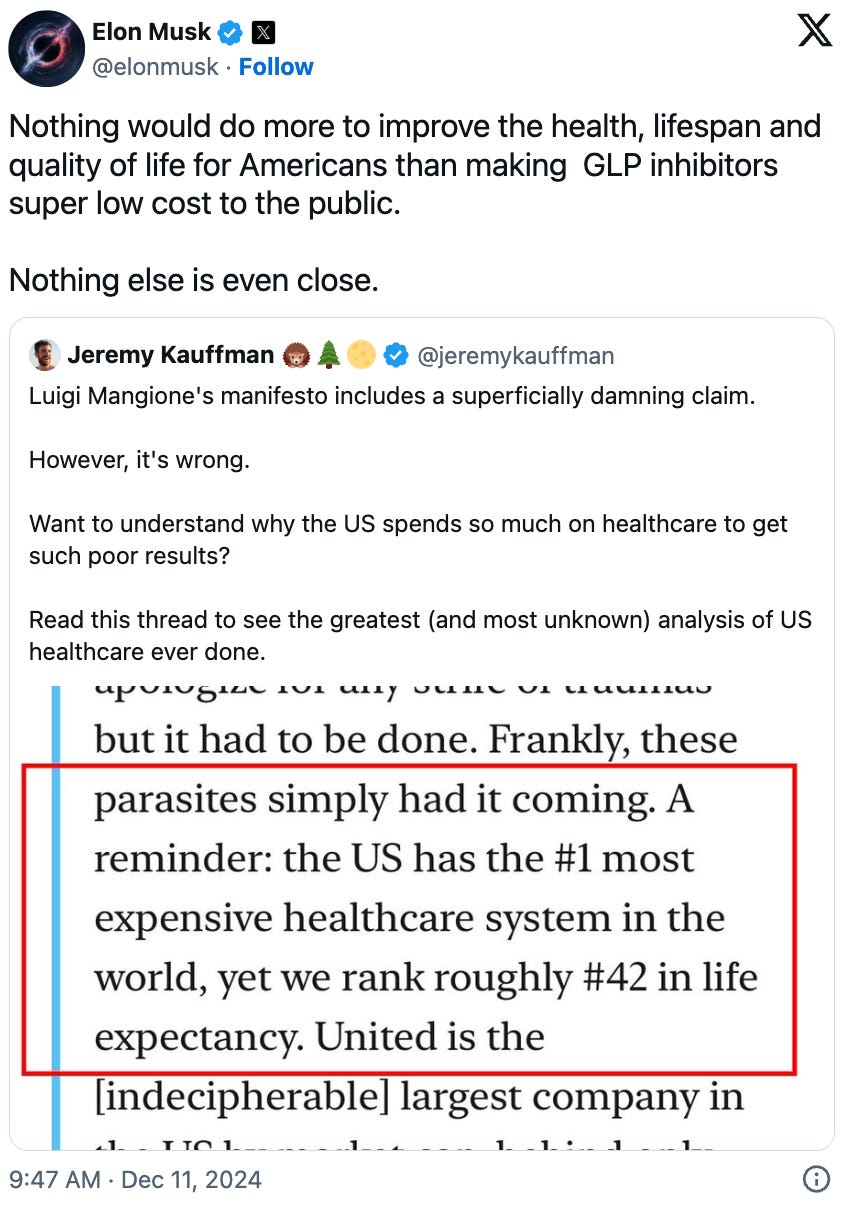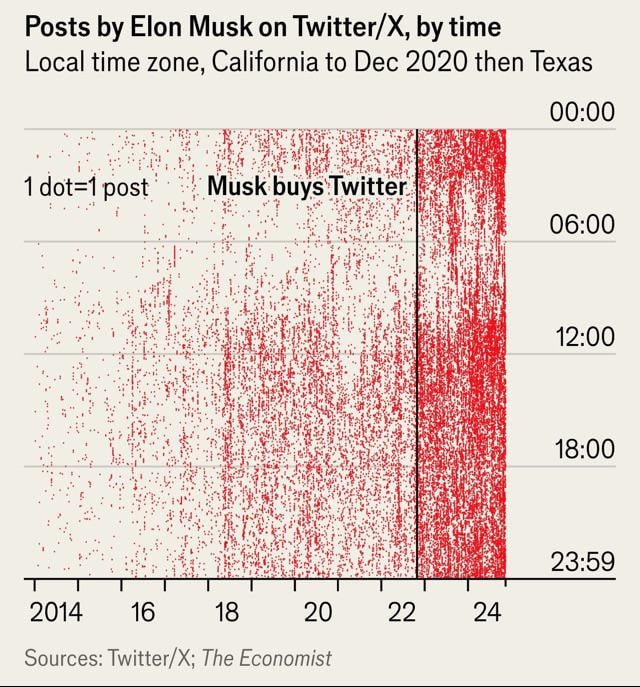"Ozempic Crazy": Unmasking the psychiatric and societal side-effects of GLP-1 agonists
A Nature article reveals emerging evidence that GLP-1 agonists have significant psychiatric side effects. I think it's even worse than it seems, and we are already seeing societal repercussions.
We have to talk about GLP-1 agonists (Ozempic, Mounjaro). Much hyped online, FDA-approved diabetes wonder drugs, now touted for treating obesity. People (and some preliminary studies) claim they can treat basically everything, from alcoholism to polycystic ovary syndrome (PCOS). Many celebrities have been using them off-label for some years. Not many people seem to be taking a rigorous or critical stance.
However, recent developments online, and trending terms such as “Ozempic face,” meaning a gaunt, drawn facial sagging caused by weight loss, “Ozempic personality” referring to side effects such as anxiety, depression and anhedonia, and “Ozempic crazy” which suggests people are obsessing over the drug (to the point that there is a shortage for diabetic application), suggest a shift in sentiments towards these substances.
Whats the relevance? Over 40% of Americans are obese. 1 out of 4 Americans plan to use GLP-1 agonists to lose weight in 2025. 1 out of 7 have already used them. The weight loss drug market is projected to grow exponentially year on year. The individual cost of use of these drugs without insurance is around $1000 a month.
Late 2024, a Nature publication found an increase in psychiatric complaints in patients taking GLP-1 drugs. The findings showed approximately 100% increase in the incidence of suicidal ideation, 100% increase in anxiety symptoms, and 200% increase in depressive symptoms in a large population over an 8 year time frame. The longer the participants took these drugs and the higher the dose, the more severe these effects. It is of note that to maintain weight lost on the drugs, you have to stay on them. Other publications have associated the drugs with mania, as well as lower overall drive and motivation.
Why weren’t these effects noted during clinical trials? For a start, likely a shorter follow-up timeframe. More importantly, the exclusion criteria. People who are or have been recently diagnosed with depression are excluded from clinical trials in order to study a “healthy” population. This is not the same as an actual representative population. In a normal population, people who are depressed are included. In regards to these studies, it’s important to understand that people who are obese or diabetic are extremely likely to have depression, due to the inflammatory physiology which is implicated in both conditions, and also more broadly in psychiatric and metabolic disease.
As such, it was noted in the Nature study, the majority of actual obese patients were excluded from the phase III clinical trials. At best, this is pretty terrible negligence, fuelled by cost-cutting, by the pharmaceutical companies involved, at worst weaponised incompetence of the worst kind and naked profiteering which exploits a highly vulnerable group of people.
In sum, according to the Nature paper, people are experiencing psychiatric side effects from prolonged GLP-1 use. I think it’s even worse than the paper describes. Although their own exclusion criteria is more inclusive than the phase III clinical trials, they still exclude populations diagnosed with: depression, bipolar depression, schizoaffective disorder, anxiety and suicidal ideation within a year prior and a week after the start of drug therapy. These psychiatric disorders are highly associated with metabolic disorders like obesity, cardiovascular disease, asthma and diabetes- the key markets proposed for the drugs. Thus, even in the more representative Nature expose, the populations most psychologically vulnerable to GLP-1 agonist drugs’ side effects were excluded, and they so happen to be the populations most likely to be put on these medications. Of course, in ethical medical practice drugs would not be prescribed to these populations, however many people living with these conditions remain undiagnosed.
Why do the drugs have side effects on mood? They are proposed to affect dopamine functioning in the brain. In addition, they work on blood sugar levels. Blood sugar regulation problems (for example in diabetes, but also in psychiatric disorder) are associated with mood swings, as anyone who has ever been “hangry” well knows.
Obviously, the individual impact of these side effects can be massive. What about societal impacts? Lots of celebrities and influential figures have been using these drugs for a WHILE. Wealthiest guy ever Elon Musk has been using these drugs, for years already it seems, and has been outspoken encouraging others to do so.
Musk has previously spoken in a non committal manner about various mental health issues, for example he has previously tweeted he is bipolar-
He has Aspergers syndrome:
Takes ketamine for depression:
Also refuses to go to therapy:
Has been outspoken in support of GLP-1 drugs for years already and still takes Mounjaro personally.
He also looks like he has the facial effects, in case you missed one of the myriad daily updates of his appearance broadcast to every internet user in the world he is looking increasingly gaunt of late. I think that Musk’s increasingly unhinged (read: manic, obsessive, and aggressive) behaviour may be related to his long term use of GLP-1 drugs.
Also demonstrated by his exponentially increasing Twitter output (he seems to be going for many days without sleep at all, assuming someone is not being paid to tweet for him):
And maybe also related to his extreme fecundity:
And obsession with dismembering the U.S. Federal government to dodge, or “DOGE,” taxes (yeah, yeah… very funny. I don’t see anyone else laughing Elon).
Some other famous overweight or obese individuals may be examples of this phenomenon. Kanye West, for example, with his recent radical weight loss, reputed controlling tendencies and erratic Nazi behaviour.
These individuals may be adding a darker meaning to the term “Ozempic crazy.” In my opinion, it is clear that people have already started intuitively connecting the drugs with these behaviours. I propose a connection with the increasing severity of these behaviours is likely. However, it must be noted that there are numerous other factors involved. Obviously, it must be emphasised these individuals are responsible, and must be held accountable for their behaviour. However, it raises the question: how can we hold them accountable as a society? One does not simply section (institutionalise) a billionaire … or a president for that matter.






![[object Object] [object Object]](https://substackcdn.com/image/fetch/$s_!Wh7S!,w_1456,c_limit,f_auto,q_auto:good,fl_progressive:steep/https%3A%2F%2Fsubstack-post-media.s3.amazonaws.com%2Fpublic%2Fimages%2Fd617476c-65c4-49a0-bf70-ae4855a906af_1080x549.png)












